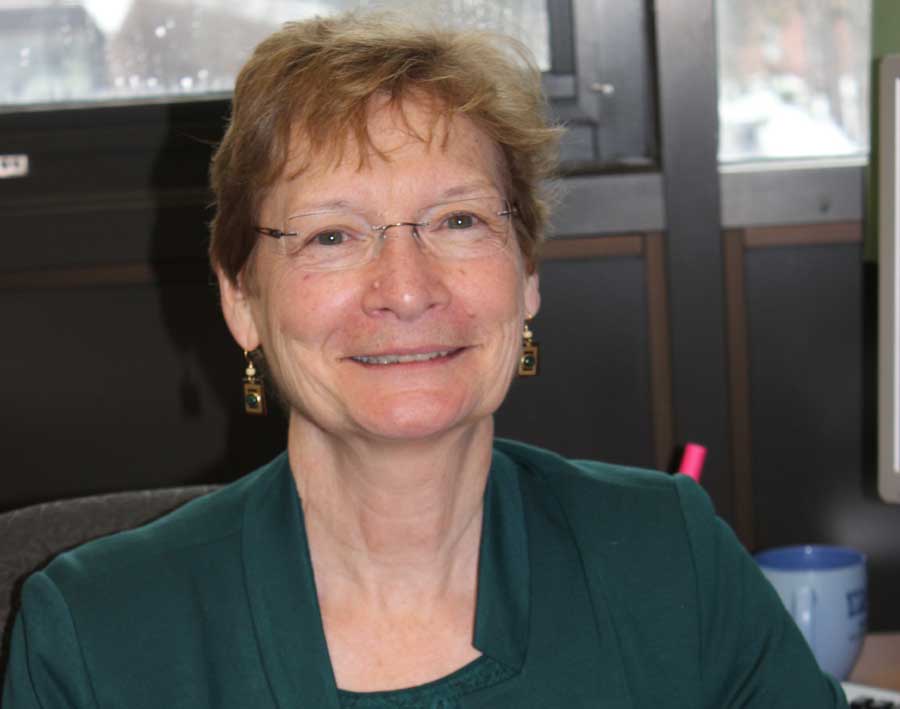Science grants offer research experience opportunities
Two professors in the Environmental and Health Sciences department at Johnson State College will be able to continue their research projects this year with the help of a 1-year grant awarded to each by the Vermont Genetics Network.
VGN is a program at the University of Vermont that is funded by the National Institutes of Health, and every year they have competitions for grants among full-time faculty at the Baccalaureate colleges in Vermont. This includes faculty from Norwich, Middlebury, St. Michael’s College, Green Mountain, Castleton, Lyndon State, and Johnson State.
“They can compete in one of two categories,” said Elizabeth Dolci, professor of environmental and health sciences at JSC. “One of them is a project grant, which will basically provide $75,000 for a year, to carry out research. The other is a pilot grant, which is about $25,000, to get a research program started.”
The award Dolci received this year was a renewal of her project grant, which she says she’s been able to renew every year for the past five years. Amy Welch, assistant professor of environmental and health sciences at JSC, received a pilot grant last year, and this year has been awarded the more substantial project grant.
“There is always that concern among us that we will not be able to renew our grants,” said Dolci. “The funding rate is very low right now, at the national level. Probably anywhere from 10-15 percent of the applications received at the national level will get funded; it’s a very low percentage. The competition within the state of Vermont isn’t as rigorous as the national level, but it is becoming more competitive, and there are people who don’t get funded.”
The purpose of these research grants, according to Dolci, is to have investigators in Vermont at the baccalaureate colleges become successful, independent scientists who will be funded by outside sources like NIH and the National Science Foundation. Professor of Behavioral Sciences Gina Mireault is actually a graduate of the VGN program, and now has her own NIH grant to work on research regarding humor in infants.
Both Dolci and Welch have funding within their grants to also offer undergraduates or recent graduates experience in the field. Welch will choose two students to assist her with her research, and Dolci has funding for five students to assist her.
“The students actually do the research for these projects,” said Dolci. “I oversee the project while they get to do the hands-on work, because we don’t have technicians. I’m currently looking at microbial community structure at the asbestos mine in Eden and Lowell, Vt. We’re looking at aquatic environments there, and the bacterial composition within the pit pond and some nearby streams. Anyone who drives by can see that the environment there is pretty impacted. There are a lot of asbestos fibers around, but there are also a lot of heavy metals from the rock composition that are being leached into the sediment and water ways.”
The asbestos, combined with the saturation of heavy metals, creates a very high, alkaline, PH balance. Organisms have to accommodate to these stresses. Dolci and her team of students are looking at what is living there, at the bacterial level, and how they interact and accommodate to each other as well as stress.
Over the years12 students have had the chance to work with Dolci on this project. Joining the professor at the asbestos mines to continue research this semester is Erika English, a December grad who has worked with Dolci for three years; Eliza Chevalier, who started working on the project last summer; Hannah Sargent; Eliza Doncaster; and Shayna Bennett.
Early next month, the students will be presenting their findings at a national conference at the University of Kentucky.
This summer the group will change a little, with English, Bennett and Chevalier continuing research full-time, along with two new students, Javayla Davis and Abigail Murphy. Each student working on the project over the summer will be receiving a stipend between $4,500 and $5,000. Essentially, it is a summer job that they’ll be able to do within their major.
Students were chosen through professor observation within labs. Dolci teaches some intro and upper-level bio classes, and observes how students work in lab from their attention to detail to their level of organization and types of arguments they have with each other. “Sometimes students will approach me,” said Dolci, “and we discuss options, and whether it will be a good fit, but most of the time it works by invitation only. You don’t have to be an “A” student to do well on the project, either.”
Along with the two grants from VGN, three faculty members at JSC will be funded by Vermont Experimental Program to Stimulate Competitive Research this semester as part of the RACC (Research on Adaptations of Climate Control) program. Those professors are Robert Genter, Tania Bacchus, and Leslie Kanat, who are all professors of environmental and health science. Some of them will also have undergraduates working under them. EPSCoR is a statewide program which receives 225 applications from students around Vermont, who will work with JSC faculty as well as other college faculty around Vermont. The program accepted 40 students from across the state.
Kayla served as a general assignment reporter and photographer for the spring 2013 semester. She returned for the Fall 2013 and spring 2014 semesters...



